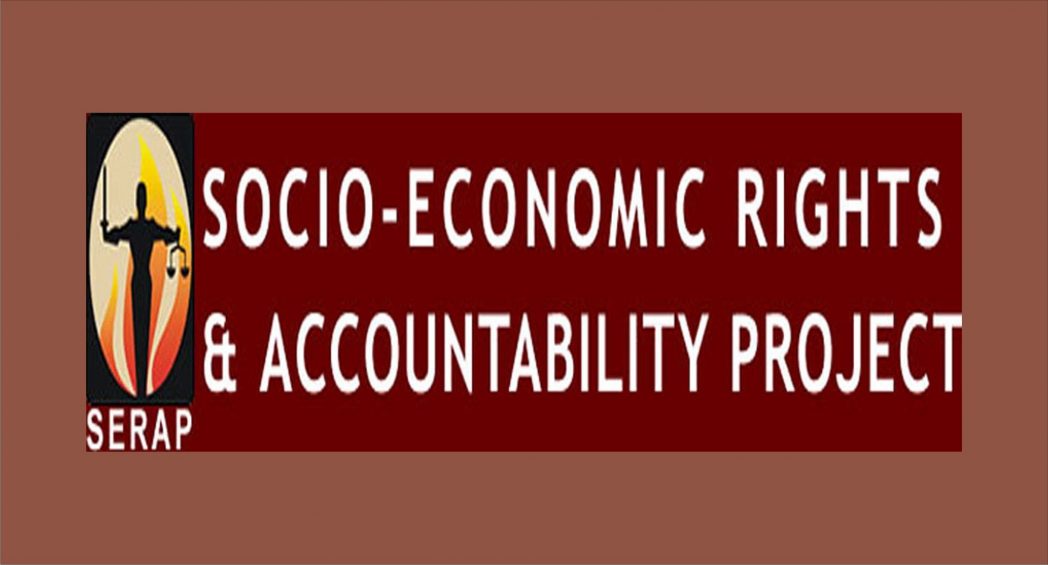News
SERAP’s Report Predicts Increased Corruption Under Buhari …Says Police Most Corrupt Institution In Nigeria

A report by Socio-Economic Rights and Accountability Project has predicted increased corruption in the country in the coming year.
The report, “Nigeria Anti-Corruption Performance Assessment Survey,” was presented to the public yesterday in Lagos.
SERAP said it was based on a survey it conducted across the country’s six geo-political zones between November and December 2018.
The report, it said, captured the views of 2,655 Nigerians in seven states and the Federal Capital Territory, Abuja on government’s anti-corruption fight.
President Muhammadu Buhari’s administration is headlined by the fight against corruption.
However, the respondents, whose views were captured in SERAP’s report, believed that corruption level had remained the same and would increase in spite of government’s anti-corruption crusade.
According to the report, the respondents believed that government’s anti-corruption efforts are “inadequate and unconvincing.”
They also hinged their scepticism on the fact that “elections do not result to a different government,” adding that “most leaders are corrupt and only pursue personal interests.”
The report said, “When asked to project the level of corruption in the coming year, about 41 per cent (of respondents) believed it will either increase or remain the same with about third of the respondents expecting corruption levels to increase.”
SERAP said the outcome of the survey should “trigger reflection among the various anti-corruption bodies in Nigeria.”
The group said, “When juxtaposed against the different institutions established and laws and policies currently being implemented, it raises the critical question whether the (anti-corruption) measures are comprehensive enough, consistent or if there is a need to amplify public participation and communication on anti-corruption efforts.”
SERAP said the public perception of government’s anti-corruption war, as reflected by the report, “is likely to dilute public support needed for successful anti-corruption initiatives.”
The report rated the police as the public institution with the highest rate of bribery, based on the judgement of 829 of the respondents, representing 66.6 per cent.
The power sector, education and the judiciary ranked next after the police on the prevalence of bribery.
SERAP, in the report, noted that “The government ascended to power on the promise of tackling corruption.
Meanwhile, a new public survey released, yesterday, by Socio-Economic Rights and Accountability Project (SERAP) has revealed high level of corruption in public institutions in Nigeria for the past five years.
Of the five major public institutions surveyed, the police emerged as the most corrupt, with the power sector identified as the second most corrupt in the country, today.
Other public institutions identified as corrupt by 70 per cent of Nigerians surveyed are: the judiciary, education and health ministries.
The survey reveals that the level of corruption has not changed in the last 5 years.
The latest report by SERAP entitled, “Nigeria: Corruption Perception Survey”, was launched, yesterday, at the Sheraton Hotels, Lagos.
According to the survey, “a bribe is paid in 54 per cent of interactions with the police. In fact, there is a 63 per cent probability that an average Nigerian would be asked to pay a bribe each time he or she interacted with the police. That is almost two out of three.”
The Chair of the report launch, Prof Akin Oyebode said: “Nigeria is looked upon as a giant of Africa. Yet, Nigeria could not conduct free, fair and credible elections. It is a smear on the image of Nigeria. If we do away with selective enforcement and condonation of corruption, we will build and live in a better society. Corruption is a refined form of stealing. The politicians are stealing our common patrimony. Development of the people is almost inversely proportional to the level of corruption.”
The report read in part: “Corruption remains a significant impediment to law enforcement, access to justice and basic public services such as affordable healthcare, education, and electricity supply. Several Nigerians have to pay a bribe to access police, judiciary, power, education and health services. Corruption is still a key concern in the country with 70% of Nigerians describing the level of corruption as high and in the same measure, stating that corruption levels either increased or remained the same in the last five years.
“The national survey carried out between September and December, 2018, covered the police, judiciary, power, education and health sectors to assess the state of corruption in law enforcement and public service provision.”
“From the analysis of the anti-corruption legal and institutional framework in Nigeria, the following cross-cutting issues emerged: there is lack of political goodwill to consistently enforce the different anti-corruption laws; inadequate funding for the various anti-corruption agencies; weak public support and/or ownership of anti-corruption initiatives; poor clarity of roles between various anti-corruption agencies; and public perceptions of politicisation of corruption arrests and prosecutions.
“Bribery experiences were interrogated and recorded in the key sectors of education, health, the police, judiciary and power. Data analysis was conducted under five different and interrelated variables. There was a 63 per cent probability that an average Nigerian would be asked to pay a bribe each time he/she interacted with the police. The likelihood of bribery in the power sector stood at 49 per cent. With the chances of encountering bribery at the judiciary, education and health services standing at 27 per cent, 25 per cent and 20 per cent, respectively.
“The police were the most adversely ranked on this indicator. For every 100 police interactions reported by the respondents, there was a bribe paid in 54 interactions. The prevalence levels stood at 37 per cent in the power sector and 18 per cent in education, 17.7 per cent in the judiciary and 14 per cent in the health sector.”
According to the report, “51 per cent of the individuals that paid bribes to the police and 35 per cent to the power sector believed this was the only way to access the services sought from the institutions. The ranking of the education sector and the judiciary was less adverse with 16 per cent perceiving bribery as the main avenue of accessing services in the institutions, and health services recording 13 per cent.
“The police and judiciary had the largest proportion of total bribes paid at 33 per cent and 31 per cent respectively. Bribes paid for education, power and health services accounted for 19 per cent, 10.9 and 5 per cent, respectively of all bribes reported. The average amount of bribe paid by the respondents was highest among those who paid to the judiciary at about N108,000 ($298). All the other institutions ranked lower on this variable with N12,253 and N11,566 reportedly paid to the police and education sectors, and N6,462 and N5,143 paid for health and power services, respectively.
“Perceptions on corruption trends in Nigeria show almost 70 per cent of the respondents perceived the current level of corruption as high compared to 15.5 per cent that felt it was low. 70 per cent of the respondents said corruption levels either increased or remained the same in the last five years. Only a quarter of the respondents felt corruption reduced in this period.
“About 41 per cent of the respondents projected that corruption will either increase or remain the same in the next year. About a third of the respondents (31.5 per cent) believed the ruling elite are pursuing their selfish interests only therefore corruption levels will increase into the future.
“Additionally, about a quarter of the respondents (24.9 per cent) believed the current anti-corruption efforts are not comprehensive enough. The poor state of the economy was also seen as a driving factor to increased corruption at 17.2 per cent.
“Respondents identified poor coordination among the different state players as a key obstacle at 18.4 per cent. Lack of political will from the government and weak public support were ranked second at 12 per cent. Civic action against poor governance: 54.8 per cent of the respondents reported that they had not taken any action against poor governance. That more than a half of the respondents were unwilling to initiate action is alarming and points to low confidence levels that appropriate measures would be taken even if the respondents took action.
“This assumption is buttressed by the finding that 82 per cent of the actions taken were either not responded to or deemed sufficiently appropriate. Low civic action may also indicate low levels of public awareness on what redress mechanisms exist or how to access them.
“The Federal government should establish an independent commission of inquiry to conduct a transparent, comprehensive, and impartial investigation into systemic corruption within the Nigeria Police Force, judiciary, and the ministries of power, education and health.
“The Inspector General of Police should receive and investigate complaints of bribery and corruption against police officers filed by members of the public. The police should liaise with community leaders and civil society organisations in regard to incidents of police bribery and corruption within the community.
“The Chief Justice of Nigeria and the National Judicial Council should identify and review all outstanding cases of judicial corruption and refer such cases to appropriate anti-corruption agencies. They should apply the Code of Conduct for Judicial Officers in a consistent and transparent manner, with full respect for the fundamental guarantees of fair trial and due process.
“The Chief Justice of Nigeria and the NJC should publish annual reports of all activities involving the judiciary, including expenditure, and provide the public with reliable information about its governance and organisation, including the number of judges found to be corrupt, as well as ensure that the Chief Justice of Nigeria and all other judges make periodic asset disclosures.
“The National Assembly should move swiftly to amend the Code of Conduct Bureau and Tribunal Act to ensure public access to asset declarations made by public officials, and urgently pass the Proceeds of Crime Bill, the Whistleblowers Bill, and the Witness Protection Bill among other relevant pieces of legislation.
“The National Assembly should immediately publish all reports of investigations on corruption and corruption-related matters in the judiciary, education, power and health sectors among others that have been conducted by the National Assembly since the return of democracy in 1999.
“A positive legacy by the in-coming administration on May 29, 2019 and the recently appointed Inspector General of Police will mean improving accountability of the police, and proactively working to end all forms of corruption within the rank and file of the police. The Inspector General of Police should streamline and prioritise internal control mechanisms by establishing an Ethics and Integrity Unit at each police station. The unit should include a human rights officer, an anti-corruption officer, and an officer responsible for service delivery complaints.
News
Bonny-Bodo Road: FG Offers Additional N20bn, Targets December Deadline

The Federal Government has agreed to offer additional N20.5 billion for the completion of the Bonny-Bodo road project in December.
The government, however, said if the construction company, Julius Berger, was not ready to accept the offer, the contract will be terminated.
Minister of Works, David Umahi, said this during a meeting with the Managing Director of Julius Berger, Lars Ritcher and members of Bodo-Bonny Road Peace Committee, on Wednesday in Abuja.
The reports that Julius Berger had requested asking for a N28 billion variation on the 82 per cent completed project.
The company hinged its request on the rise in exchange rate, construction materials, and diesel among others.
Umahi, however, said the government was willing to provide N20 billion out of the N28 billion that Julius Berger requested for.
According to him, the Bonny-Bodo road contract which was initially awarded at the cost of N120 billion in 2015, was later varied at N199 billion with a completion dateline of December 2023, which has since elapsed.
The Tide’s source recalls that in 2017, an agreement between the Federal Government, Nigeria Liquefied Natural Gas (NLNG) and Julus Berger on modalities for funding the project cost of N199.923 billion, without any further increase.
“If you do not accept the Federal Government’s offer by Friday and resume work on the site, the previously expired 14-day ultimatum for termination of project will be enforced.
“I want to let you know that we are the client. No contractor will dictate for this ministry, and there is no job that is compulsory that a particular contractor must do.
“We give you an offer. If you do not like the offer, you walk away. You don’t force us or we don’t force you.
“Agreement of contractual relationship is a mutual understanding,’’ the minister said.
Umahi said that had Julius Berger adhered to the project timetable, the project would have been completed on schedule before the impact of foreign exchange.
“Our position is very simple, we reject the conditions of Julius Berger totally and we ask Berger to please go back to the site to complete the project based on our offer.
“Our offer is unconditional and we say, accept or reject, so you cannot subject our offer to your conditions ,’’ he added
Umahi said the company should be humble in its dealings and exhibit solidarity during challenges.
Earlier, Richter had explained that the company suspended work on the site to seek some clarifications from the ministry.
According to him, the company asked for the augmemtation of N28 bilion because as at the time the contract was awarded the exchange rate was N305 to a dollar and diesel was N350 eor litre.
“We will still require some outstanding materials; that means that the initial agreement can’t fly because the variation of project is not sufficient and the exchange rate is also not in our favour to compensate the additional costs.
“That is why we decided to go back to our original proposal of the augmentation. Augmentation is a very normal process for all contracts,” the managing director said.
Chief Abel Attoni, Palace Secretary, Bonny Kingdom, expressed gratitude to President Bola Ahmed Tinubu over the decision to complete the Bodo-Bonny road project.
Attonu urged the parties to be patriotic and make the necessary sacrifice for the actualisation of the project.
News
Court Vacates Arrest Warrant Against Ehie, Five Others

The Federal High Court, sitting in Abuja, yesterday, set aside the warrant of arrest against Rt. Hon. Edison Ehie, the Chief of Staff, Government House, Rivers State, and five others.
Justice Emeka Nwite stated this while delivering his ruling in an application seeking to vacate the warrant of arrest which he issued on January 31, 2024.
The Judge said he was misled by the police in ordering the arrest of Ehie in connection with the burning of the Rivers State House of Assembly on October 30, 2023.
The Police, had told the court that Ehie and five others masterminded the bombing of the Rivers State House of Assembly amid a plot to impeach Rivers State Governor, Siminalayi Fubara.
The five others are Jinjiri Bala, Happy Benedict, Progress Joseph, Adokiye Oyagiri, and Chibuike Peter, alias Rambo.
Justice Emeka Nwite while setting aside the warrant said it has now become a mere academic exercise.
The judge further granted same to the 2nd to 5th Defendant/Applicant in same suit.
Femi Falana, SAN, and Oluwole Aladedoye, SAN, who appeared for the defendants in separate suits, held that the court lacked the jurisdiction to have granted the order.
While Falana filed a motion seeking an order to set aside the January 31 order by Justice Nwite, Aladedoye applied for a stay of execution of the arrest order.
In a motion marked: FHC/ABJ/CS/112/2024 dated February 2 and filed on February 7 by Falana, Ehie sought two orders, including “an order setting aside the order made on January 31 for want of jurisdiction.
“An order of this honourable court staying the execution of the order made on the 31st January 2024, pending the hearing and determination of this application.”
Giving six grounds of argument, Falana argued that the complainant had not filed any criminal charge or motion before the court.
The senior lawyer argued that the court lacked the territorial jurisdiction to entertain the ex-parte application as the alleged offences of conspiracy, attempted murder, murder and arson took place in Port Harcourt, the state capital.
“He submitted that the court lacked the vires to grant an application to arrest and declare his clients wanted in respect of the alleged offences.
“The complainant/respondent (IG) did not adduce evidence of terrorism in the affidavit in support of the application.
“The complainant/respondent did not cite any section of the Terrorism Prevention Act, 2013 (as amended) alleged to have been contravened by the applicants,” he argued.
Aladedoye in a motion on notice dated and filed February 9, on behalf of the five defendants, sought two orders, including
“an order staying execution or further execution of the order(s) of this honourable court made on the 31st of January, 2024, pending the hearing and determination of the appeal filed by the applicants.
“An order of injunction restraining the complainant from carrying out or further carrying out the orders of this honourable court made on the 31st January 2024, pending the hearing and determination of the appeal filed by the applicant in this case.”
Giving a three-ground argument, Aladedoye said that a notice of appeal had already been filed against Justice Nwite’s orders.
According to the senior lawyer, the notice of appeal contains grounds that challenge the jurisdiction of the honourable court.
The Inspector-General had, in a charge marked: FHC/ABJ/CR/25/2024, arraigned the defendants on a seven-count criminal charge bordering on terrorism and murder.
News
13 Students Bag First Class, 182 PhD As IAUOE Graduates 5,550, Today
The authorities of Ignatius Ajuru University of Education (IAUOE), Rumuolumeni, in Rivers State, have stated that 13 students will be graduating with first class while 182 graduands will bag Ph.D during the 42nd convocation ceremony of the university billed to hold today and tomorrow.
The Acting Vice Chancellor of the University, Prof. Okechuku Onuchuku, disclosed this during pre-convocation press briefing held in his office, yesterday, to unveil the programme for the convocation ceremony.
Onuchuku said that the 13 students were among the 4,653 graduands expected to graduate for the 2022/2023 academic session with first degree, while 897 students will be graduating with postgraduate degrees.
The Acting Vice Chancellor while giving the breakdown stated that 13 students made first class, 890 students bagged second class upper while 2,739 students had second class lower for first degree.
He further stated that 182 graduands bagged PhD, 667 got master’s degree and 48 got postgraduate diploma, adding that the convocation ceremony will hold today and tomorrow for first degree graduands and postgraduate graduands respectively.
He said that a total of 47 programmes out of the 54 programmes being undertaken at the first degree levels had been given full accreditation by the National University Commission (NUC) as well as all the programmes at the postgraduate school.
“We have ensured that our programmes both at the first degree and post graduates are in line with the NUC stipulated guidelines and speculations. We have also ensured that we are in line with both our academic and administrative policies,” he said.
Prof. Okechukwu urged the graduating students of the institution to always remember to use thier positions to help their alma mater as well as project the institution in a good image in the larger society.
“Try to ensure you finish any project you want to do, evaluate it first and avoid unfinished or abandoned projects. We will be graduating first degree graduands on Friday while Saturday will be for postgraduates, “he added.
Prof. Onuchukwu also said his administration had achieved a lot since he assumed office as Acting Vice Chancellor, stressing that his administration had improved on the welfare of the staff and the students.
“There are a lot of projects completed in the school; we have also given scholarship to some students and also encouraged departments to do same. We also impacted positively on our host communities”, he said.
Akujobi Amadi
-
Politics1 day ago
Fubara’ll Leave Rivers Better Than Expected – LG Boss
-
Sports1 day ago
Eaglets Held In Pre-WAFU Friendly
-

 News1 day ago
News1 day agoRHI: Lady Fubara Donates 50,000 Books To Public Schools In Rivers
-
Women1 day ago
The Wise Woman
-
Niger Delta1 day ago
Steer Clear Of NNS Delta, Commander Warns Criminals
-
Business1 day ago
‘Gas Infrastructure Devt, Key To Energy Sector Growth’
-

 Sports1 day ago
Sports1 day agoVan Dijk Questions Liverpool After Title Setback
-
Politics1 day ago
We’ll Not Succumb To Political Banditry-Stakeholders

